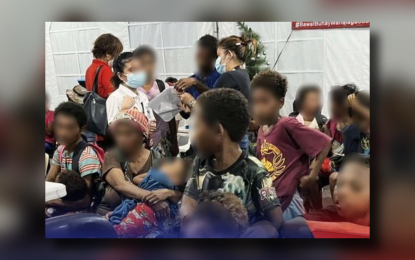
OPLAN PAG-ABOT. Beneficiaries of the Department of Social Welfare and Development’s Oplan Pag-Abot are seen in this undated photo. President Ferdinand R. Marcos Jr. has institutionalized the Pag-Abot Program to ensure the effective delivery of services to disadvantaged and vulnerable individuals living on the streets. (Photo courtesy of DSWD)
MANILA – President Ferdinand R. Marcos Jr. has institutionalized the Department of Social Welfare and Development’s (DSWD) Pag-Abot Program to ensure the effective delivery of services to disadvantaged and vulnerable individuals living on the streets.
Under Executive Order (EO) 52, which was signed by Marcos on Thursday, the Pag-Abot Program will consist of nine component assistance packages -- financial assistance; transportation or relocation assistance; transitory shelter assistance; livelihood assistance; employment assistance; psychosocial support; capability building of communities; capacity building of local government units (LGUs); and community assistance.
“The Philippines is fully committed to realizing the United Nations Sustainable Development Goal No. 1 of eradicating poverty, implementing nationally appropriate social protection systems and measures for all, and granting equal access to economic resources, particularly for the poor and vulnerable sector of society,” EO 52 read.
“The Pag-Abot Program is hereby institutionalized as a platform for an enhanced and unified delivery of services to vulnerable and disadvantaged children, individuals, and families in street situations, through provision of social safety nets and protection against risks brought about by poverty.”
As part of the efforts to address poverty and social and economic equality in the country, an Inter-Agency Committee is created to ensure alignment with the objectives and complementation of activities of various government agencies.
The DSWD Secretary will chair the inter-agency committee, while the Secretary of the Department of the Interior and Local Government (DILG) will be the vice chair.
Members include the respective secretaries of the agriculture, labor, health, budget, and education departments; Technical Education and Skills Development Authority director general; chairperson of the Presidential Commission for the Urban Poor; the president and chief executive officer of the Small Business Corp.; and the administrator of the Cooperative Development Authority.
The Inter-Agency Committee is mandated to determine within 30 days from the issuance of EO 52 the complementary services or assistance packages to be provided by relevant national government agencies, which should be aligned and integrated with the component assistance packages of the Pag-Abot Program.
It is also directed to provide overall direction for the implementation of the Pag-Abot Program, as well as ensure the compliance of concerned government agencies in the implementation and complementation of services to the program.
It is also tasked to develop a strategic communication plan to educate the people and advocate for supportive policies at the local level, in coordination with the Presidential Communications Office.
The Inter-Agency Committee is also designated to engage, consult, and coordinate with LGUs in formulating the policies and implementation of the Pag-Abot Program.
EO 52 also requires the Inter-Agency Committee to seek the support and assistance of other government agencies, as well as consult and seek the help of the private sector, relevant stakeholders, advocacy groups, and non-government organizations.
The Inter-Agency Committee shall conduct regular quarterly meetings and may hold special meetings, when deemed necessary by the chairperson, according to the EO.
“The Inter-Agency Committee shall develop an integrated monitoring framework and a digital monitoring system containing a database of verified individual, family, and community beneficiaries, which shall measure and capture all developed deliverable areas and indicators. The Inter-Agency Committee shall also come up with a comprehensive and integrated sustainability plan,” the order said.
The Inter-Agency Committee, through the DSWD, is directed to submit to the Office of the President, through the Office of the Executive Secretary, a bi-annual report on the implementation of EO 52.
It is also mandated to formulate the rules and regulations necessary to implement the program within 30 working days from the effectivity of the order.
The initial funding requirements necessary for the implementation of EO 52 will be charged against available appropriations of the DSWD and other member agencies of the Inter-Agency Committee, subject to pertinent budgeting, accounting, and auditing laws, rules and regulations.
The funds needed for the continued implementation of EO 52 will be included in the budget proposals of the said agencies, subject to the usual budget preparation process.
The Pag-Abot Program is one of DSWD’s pilot programs, which extends assistance to vulnerable and disadvantaged individuals, children, and families in street situations by providing various interventions and opportunities to improve their social and economic status and fulfill their fundamental rights.
Under the AmBisyon Natin 2040, as embodied in the Philippine Development Plan 2023-2028, the Marcos administration endeavors to implement policies and programs that are centered on coherent economic and social transformation and equitable distribution of regional development opportunities. (PNA)
